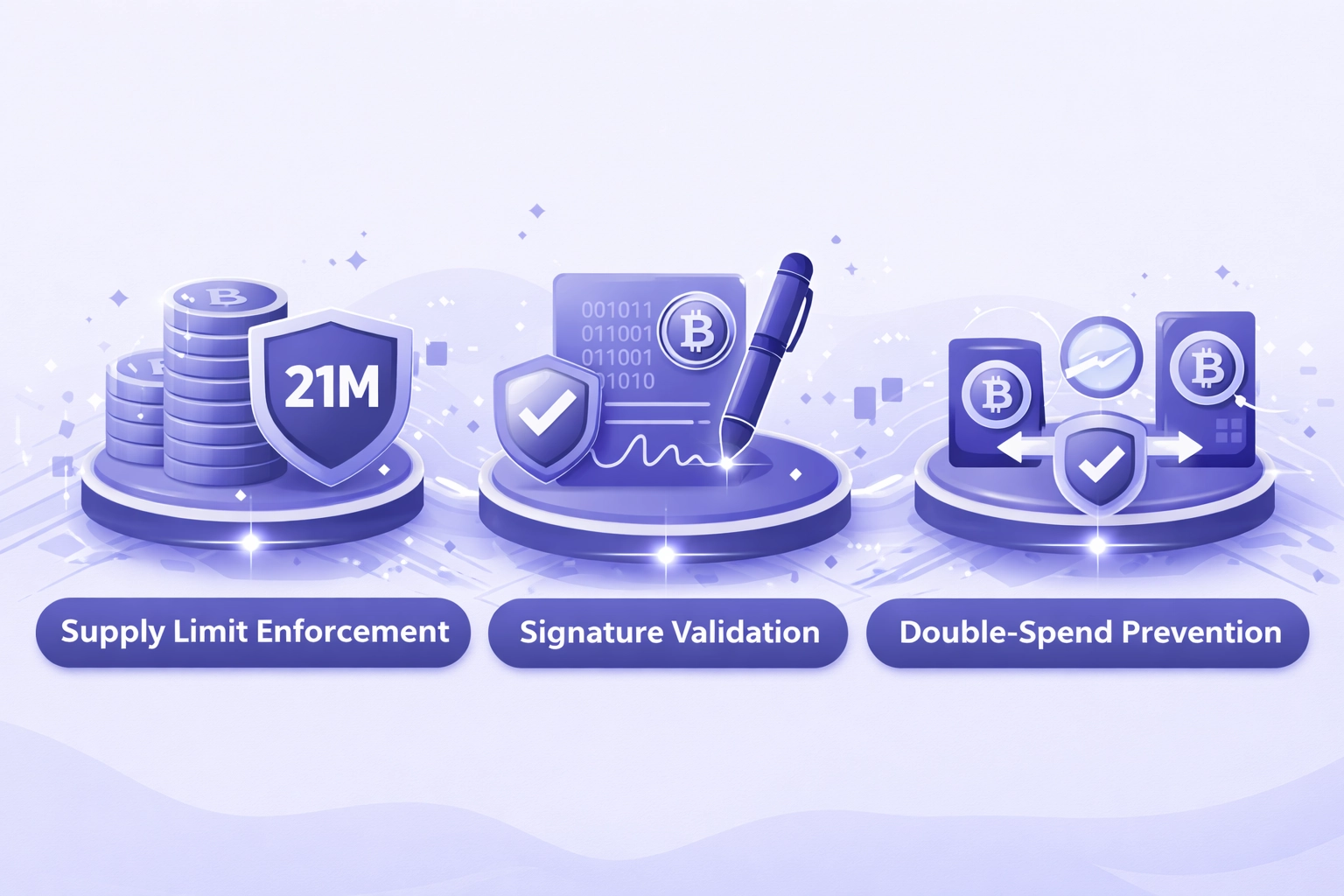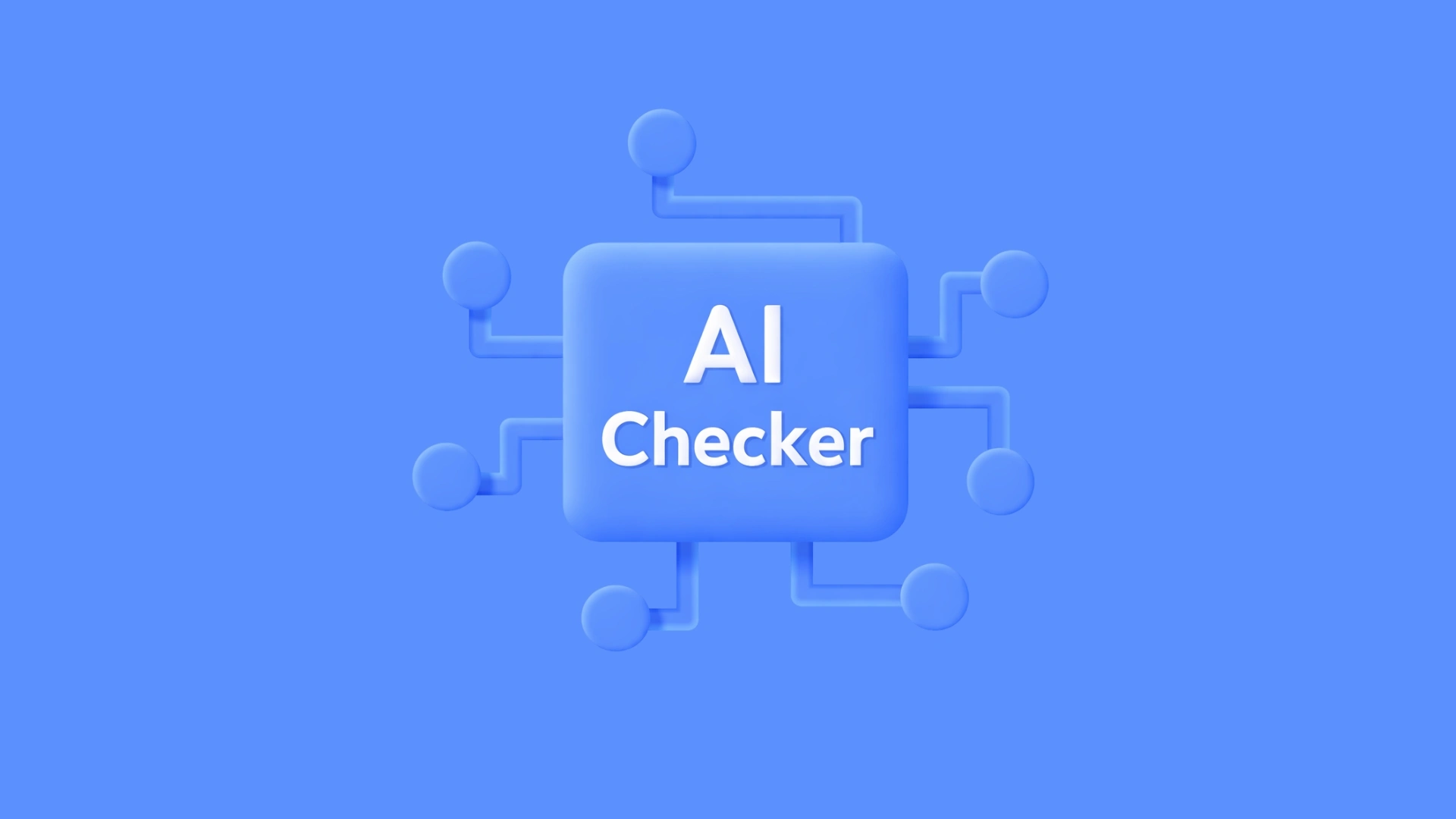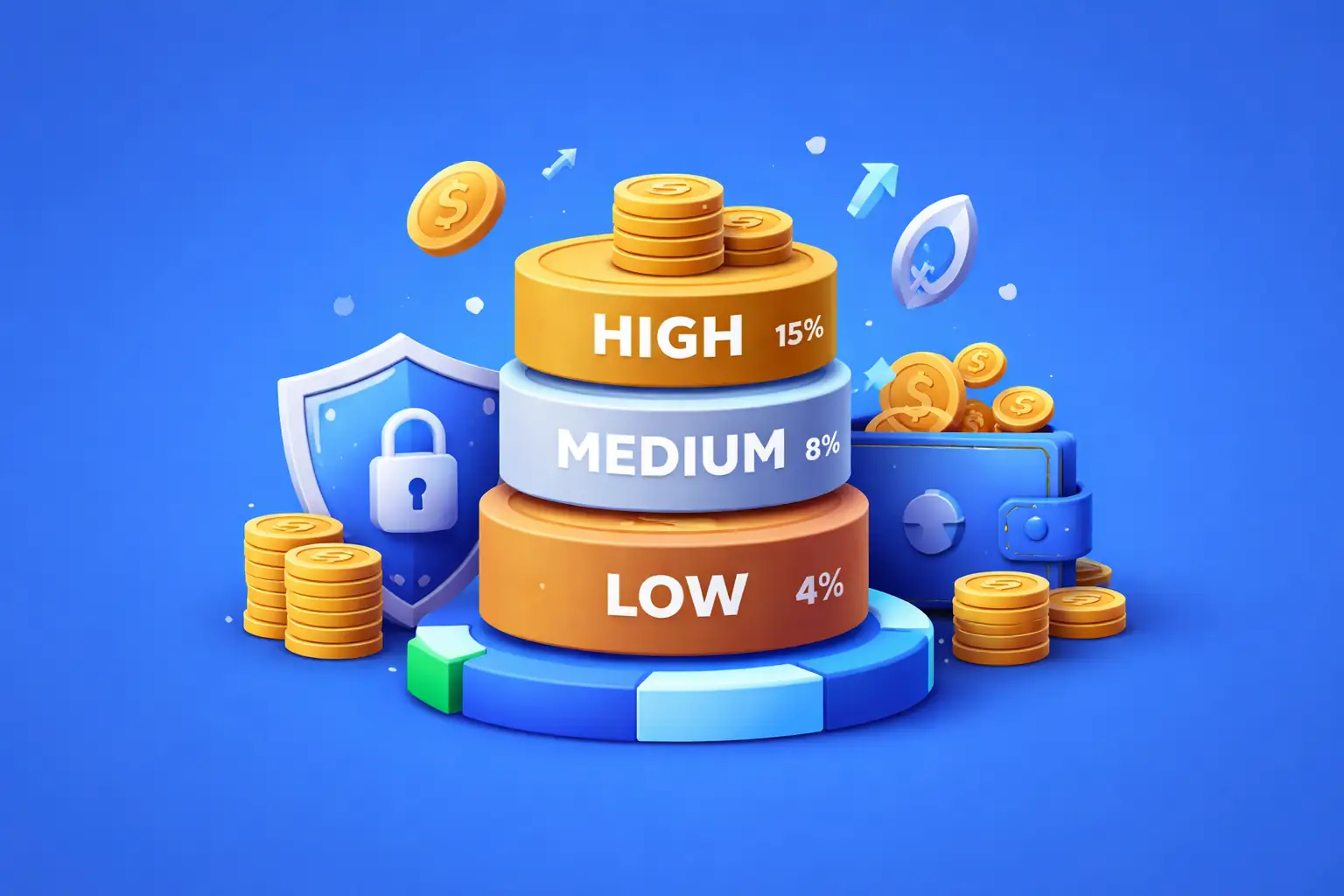Key Takeaways
- Bitcoin full nodes download and validate the entire blockchain independently, enforcing consensus rules without trusting any third-party verification services.
- Full nodes verify every transaction’s cryptographic signatures, input validity, and compliance with protocol rules before accepting them into the mempool.
- Nodes maintain the complete UTXO set enabling instant validation of transaction inputs without scanning the entire blockchain history.
- Running a personal full node provides maximum privacy by eliminating dependence on external services that could monitor your transaction activity.
- Full nodes detect and reject invalid blocks regardless of proof-of-work, protecting the network from consensus rule violations attempted by miners.
- Peer-to-peer communication protocols enable full nodes to synchronize blockchain state and propagate transactions across the decentralized network efficiently.
- Hardware requirements remain accessible with approximately 600 GB storage and modest bandwidth, enabling individuals in the USA, UK, UAE, and Canada to participate.
- Full nodes differ from mining nodes by focusing on validation and network security rather than proof-of-work computation and block creation.
- Chain reorganization detection allows full nodes to handle competing blockchain branches and converge on the chain with the most accumulated proof-of-work.
- Understanding Bitcoin full node operations provides essential knowledge for anyone building secure cryptocurrency infrastructure or participating in network governance decisions.
Bitcoin full nodes represent the foundational infrastructure that maintains Bitcoin Full Node security, decentralization, and trustless operation. These independently operated computers download, validate, and enforce every consensus rule without relying on external authorities or trusted intermediaries. Understanding how full nodes function provides critical insights into Bitcoin’s unique security model and why the network remains resistant to censorship, manipulation, and centralized control. As blockchain technology continues evolving in major financial centers across the USA, UK, UAE particularly Dubai, and Canada, the principles embodied in Bitcoin full node architecture inform broader discussions about decentralized systems and trustless verification. With over eight years of experience analyzing blockchain infrastructure, our team has witnessed how full nodes enable Bitcoin’s remarkable resilience while maintaining accessibility for individual operators who strengthen the network through distributed participation.
What Is a Bitcoin Full Node and Why It Matters
A Bitcoin full node is a computer running Bitcoin Core or compatible software that independently downloads, validates, and stores the entire blockchain from the genesis block created in January 2009 through the present day. Full nodes verify every transaction and block according to Bitcoin Full Node consensus rules without trusting any external party’s claims about blockchain validity. This complete validation distinguishes full nodes from lightweight clients or SPV wallets that only verify block headers and trust that transactions included in valid blocks are themselves valid. Full nodes maintain the complete unspent transaction output (UTXO) set, enabling instant verification of whether transaction inputs reference genuine spendable outputs. They enforce critical rules including the 21 million coin supply limit, valid proof-of-work difficulty, proper signature verification, and prevention of double-spending attempts. The distributed operation of thousands of full nodes across jurisdictions worldwide creates Bitcoin’s trustless security model. Unlike systems like Decentralized Exchange platforms that may rely on specific validator sets, Bitcoin full nodes can be operated by anyone willing to dedicate the necessary resources. This accessibility ensures that consensus rule enforcement remains distributed rather than concentrated in the hands of a few powerful entities or corporations.
The Role of Full Nodes in Bitcoin Full Node Decentralized Architecture
Full nodes serve as the enforcement layer in Bitcoin Full Node decentralized architecture, ensuring that miners, exchanges, and all network participants follow the agreed-upon protocol rules. While miners create new blocks through proof-of-work computation, full nodes determine whether those blocks are valid and worthy of acceptance into their local blockchain copy. This separation of block production from block validation creates a critical check on miner power, preventing any mining majority from unilaterally changing consensus rules. Full nodes also provide data availability, serving blockchain information to new nodes joining the network and light clients querying transaction history. They propagate valid transactions across the peer-to-peer network, ensuring that miners receive pending transactions to include in blocks. Full nodes detect and reject attempts to inflate the bitcoin supply, spend already-spent outputs, or violate any consensus rule regardless of how much computational power backs the invalid attempt. In markets across the USA, UK, UAE, and Canada, businesses accepting Bitcoin payments often run full nodes to verify incoming transactions with maximum security. The distributed operation of full nodes makes Bitcoin highly resistant to regulatory pressure or censorship attempts since shutting down the network would require simultaneously targeting thousands of independently operated nodes worldwide.
 How Bitcoin Full Nodes Enforce Consensus Rules
How Bitcoin Full Nodes Enforce Consensus Rules
Supply Limit Enforcement
- Verify coinbase transactions contain no more than the allowed subsidy plus fees
- Reject any block attempting to create Bitcoin Full Node beyond the halving schedule
- Ensure the 21 million coin maximum supply limit remains inviolable
Signature Validation
- Cryptographically verify all transaction signatures match public keys
- Reject transactions with invalid or missing signature data
- Enforce signature type restrictions according to script validation rules
Double-Spend Prevention
- Track all unspent outputs in the UTXO set database
- Reject transactions attempting to spend already-consumed outputs
- Prevent conflicting transactions from entering the mempool simultaneously
Transaction Validation Process Inside a Bitcoin Full Node
When a Bitcoin full node receives a transaction from peers, it initiates a comprehensive validation process before accepting the transaction into its mempool or relaying it to other nodes. The node first verifies basic structural validity including proper serialization format, reasonable size limits, and syntactically correct script data. It then checks that all transaction inputs reference outputs that exist in the UTXO set and have not been previously spent in confirmed blocks or conflicting mempool transactions. For each input, the node retrieves the referenced output’s script and executes the combined scriptSig and scriptPubKey to verify the cryptographic signatures authorize spending. Amount validation ensures that output values do not exceed input values, with the difference representing the miner fee. The node verifies compliance with standardness rules for mempool acceptance, checking for dust outputs, excessive signature operations, and other non-standard patterns. Script execution occurs in a sandboxed environment preventing infinite loops or excessive computational consumption. Timestamp and locktime values undergo verification to ensure transactions cannot be confirmed before specified block heights or times. Only after passing all validation checks does the node accept the transaction into its mempool and propagate it to connected peers, contributing to the transaction’s eventual confirmation in a mined block.
Block Verification: How Full Nodes Reject Invalid Blocks
Block verification by Bitcoin full nodes represents one of the most critical security functions in the network. When a node receives a new block from peers, it must validate the block header, all included transactions, and overall block structure before adding it to the blockchain. The node first verifies the proof-of-work hash meets the current difficulty target, ensuring sufficient computational work was invested in block creation. Block timestamp validation checks that the timestamp falls within acceptable bounds relative to previous blocks and the node’s local time. The node verifies the Merkle root correctly represents all included transactions through cryptographic hashing. Each transaction within the block undergoes full validation identical to mempool acceptance checks, verifying signatures, input validity, and consensus rule compliance. The coinbase transaction receives special scrutiny to ensure the block reward and collected fees do not exceed the allowed amounts according to the current halving epoch. Block size and weight limits are enforced to prevent excessive resource consumption. The node checks that transactions within the block do not conflict with each other or attempt double-spends. Only if every validation check passes does the node add the block to its local blockchain copy. If any validation fails, the node rejects the block entirely regardless of the proof-of-work invested, demonstrating how validation authority remains distributed across all full nodes rather than concentrated with miners.
UTXO Set Management and State Tracking in Full Nodes
| UTXO Component | Function | Storage Method | Update Mechanism |
|---|---|---|---|
| Output Identifiers | Reference specific transaction outputs | LevelDB key-value database | Add on block confirmation |
| Script Pubkey Data | Store spending conditions | Compressed script format | Cached for quick retrieval |
| Output Amounts | Track spendable bitcoin values | 8-byte integer values | Immutable once created |
| Coinbase Flags | Mark coinbase maturity requirements | Boolean markers | Set for mining rewards |
| Spent Status | Track output consumption | Removal from UTXO set | Delete on valid spend |
Proof-of-Work Verification by Bitcoin Full Nodes
Bitcoin full nodes verify proof-of-work for every block header to ensure miners invested the required computational effort in block creation. The verification process involves computing a double SHA-256 hash of the block header and comparing the result to the current difficulty target. The block header includes the previous block hash, Merkle root of transactions, timestamp, difficulty bits, and nonce value. Full nodes check that the resulting hash value is numerically less than the target specified in the difficulty bits field, confirming sufficient computational work was performed. Nodes also verify the difficulty target itself by recalculating the expected difficulty based on the time elapsed since the previous difficulty adjustment. Bitcoin Full Node difficulty adjustment algorithm recalibrates every 2016 blocks to maintain approximately 10-minute block intervals. Full nodes independently compute this adjustment without trusting miner claims about correct difficulty. This verification ensures that even blocks with valid proof-of-work get rejected if they claim an incorrectly low difficulty target. The distributed verification of proof-of-work by thousands of full nodes worldwide prevents miners from reducing difficulty to make block creation easier. Professional node operators in the USA, UK, UAE, and Canada contribute to this decentralized security model by independently verifying that all accepted blocks meet genuine proof-of-work requirements.
How Full Nodes Protect the Network from Double Spending
Double-spending prevention represents one of Bitcoin’s most fundamental innovations, and full nodes provide the critical enforcement mechanism that makes this prevention trustless. Each full node maintains a complete UTXO set database containing every unspent output available for spending. When validating a transaction, the node checks that all inputs reference outputs present in this UTXO set, immediately rejecting any transaction attempting to spend outputs that do not exist or have been previously consumed. The mempool maintains conflict detection logic preventing acceptance of transactions that spend the same outputs as already-accepted mempool transactions. When a transaction confirms in a block, the node updates its UTXO set by removing spent outputs and adding newly created outputs. This atomic state update ensures consistency across the validation process. If an attacker broadcasts conflicting transactions spending the same outputs to different parts of the network, honest full nodes will accept only the first-seen transaction into their mempools, preventing propagation of the conflicting double-spend attempt. Even if a miner includes a double-spending transaction in a block, full nodes will reject that block during validation regardless of valid proof-of-work. This distributed enforcement makes double-spending prohibitively difficult since an attacker would need to simultaneously compromise thousands of independently operated full nodes worldwide, an effectively impossible task given Bitcoin’s global distribution.
Mempool Logic and Transaction Propagation Mechanisms
The mempool serves as a full node’s waiting area for unconfirmed transactions, implementing sophisticated logic for transaction acceptance, prioritization, and propagation. When a node receives a transaction from a peer, it undergoes complete validation before mempool acceptance. Accepted transactions are stored in memory with metadata including arrival time, fee rates, ancestor relationships, and descendant counts. The mempool maintains a fee-based priority ordering that miners use to select transactions for block inclusion, with higher fee-rate transactions receiving priority. Nodes implement Replace-By-Fee (RBF) logic allowing users to replace unconfirmed transactions with higher-fee versions when needed. Child-Pays-For-Parent (CPFP) mechanisms enable dependent transactions to boost parent transaction priority through combined fee rates. The mempool enforces size limits to prevent memory exhaustion, evicting lowest-fee transactions when the mempool reaches capacity. Transaction propagation uses intelligent relay policies to minimize bandwidth while ensuring widespread network distribution. Nodes employ compact block relay protocols like BIP 152 to efficiently communicate new blocks using transaction identifiers rather than full transaction data. Privacy-preserving features like diffusion and random delays help obscure transaction origin. Professional node operators implement custom mempool policies based on their specific requirements while maintaining compatibility with network-wide relay standards that enable effective transaction propagation across the global Bitcoin network.
Bitcoin Full Node Operation Lifecycle
Initial Setup and Configuration
Download Bitcoin Core software, configure network settings, allocate storage space, and prepare system for initial blockchain synchronization.
Initial Block Download
Connect to peers, download complete blockchain history from genesis block, validate all historical transactions and blocks sequentially.
UTXO Set Construction
Build complete unspent transaction output database by processing all historical blocks and tracking output creation and consumption.
Network Synchronization
Catch up to blockchain tip by downloading recent blocks, establish peer connections, begin participating in transaction relay.
Active Validation Mode
Continuously validate new blocks and transactions as they arrive, maintain mempool, relay valid data to connected peers.
Ongoing Maintenance
Perform periodic database cleanup, prune old block data if configured, update software to latest versions, monitor system health.
Service Integration
Expose RPC interfaces for wallet applications, enable REST API access, configure monitoring dashboards, integrate with payment systems.
Long-term Operation
Continue enforcing consensus rules, serve blockchain data to network participants, contribute to Bitcoin’s decentralized security model indefinitely.
Fork Detection and Chain Reorganization Handling
Bitcoin full nodes must handle situations where competing blockchain branches emerge, requiring sophisticated fork detection and chain reorganization logic. Temporary forks occur naturally when multiple miners discover valid blocks nearly simultaneously, creating competing chains that briefly coexist. Full nodes track all valid chains they observe, maintaining blockchain tips for each branch while following the chain with the most accumulated proof-of-work. When a node receives a block extending a branch different from its current main chain, it evaluates whether this alternative branch has surpassed the main chain in cumulative difficulty. If the alternative chain contains more proof-of-work, the node performs a chain reorganization, switching its main chain designation to the higher-work branch. During reorganization, transactions from orphaned blocks return to the mempool if they do not conflict with transactions in the new main chain. The node updates its UTXO set to reflect the new chain state, undoing state changes from orphaned blocks and applying changes from newly accepted blocks. Deep reorganizations spanning many blocks are extremely rare due to the exponentially increasing difficulty of rewriting blockchain history. Full nodes implement reorganization limits to prevent excessive resource consumption from malicious reorganization attempts. This fork handling ensures network convergence on a single authoritative chain even in the presence of temporary disagreements about blockchain state.[1]
How Full Nodes Maintain Trustless Security Without Central Authority
The trustless security model enabled by Bitcoin full nodes represents one of cryptocurrency’s most revolutionary innovations. Unlike traditional financial systems requiring trust in banks, payment processors, or regulatory authorities, Bitcoin allows participants to verify all network activity independently through full node operation. Each node downloads the complete blockchain and validates every transaction and block according to deterministic consensus rules implemented in open-source software. No external authority can override a full node’s validation decisions or force acceptance of invalid transactions. The distributed operation of thousands of full nodes worldwide creates redundancy ensuring that even if many nodes fail or become compromised, the network continues operating correctly. Geographic and jurisdictional diversity makes simultaneous compromise of all full nodes effectively impossible. Open-source code allows anyone to audit the validation logic, ensuring transparency and preventing hidden backdoors or manipulation mechanisms. The economic incentives align such that participants benefit from running honest nodes that enforce genuine consensus rules. This trustless architecture enables Bitcoin to function as peer-to-peer electronic cash without requiring trusted intermediaries, central servers, or permission from authorities. Full node operators in diverse markets across the USA, UK, UAE, and Canada collectively maintain this decentralized security model through their independent validation activities.
Resource Requirements for Running a Bitcoin Full Node
| Resource Type | Minimum Requirement | Recommended | Professional Setup |
|---|---|---|---|
| Storage Space | 600 GB | 1 TB SSD | 2 TB NVMe SSD |
| RAM Memory | 2 GB | 8 GB | 16-32 GB |
| Monthly Bandwidth | 200 GB | 400 GB | Unlimited |
| CPU Processing | Dual-core 2 GHz | Quad-core 3 GHz | 8-core server CPU |
| Network Connection | 10 Mbps | 50 Mbps fiber | Gigabit dedicated |
Full Nodes vs Mining Nodes: Key Functional Differences
Bitcoin full nodes and mining nodes serve distinct but complementary functions within the network architecture. Full nodes focus exclusively on validation, downloading and verifying every transaction and block against consensus rules without performing proof-of-work computation. Mining nodes perform all full node functions but additionally compete to create new blocks through intensive computational work solving cryptographic puzzles. Full nodes reject invalid blocks regardless of proof-of-work, while mining nodes invest computational resources to produce valid blocks meeting difficulty targets. The resource requirements differ dramatically, with full nodes requiring modest hardware accessible to individuals, while competitive mining demands specialized ASIC hardware consuming significant electricity. Full nodes receive no direct financial rewards, operating based on operator motivations around security, privacy, and network support. Mining nodes earn block rewards and transaction fees, creating direct financial incentives for operation. Full nodes contribute to decentralization by distributing validation authority across thousands of independent operators. Mining concentration in regions with cheap electricity creates centralization pressures that full node distribution helps counterbalance. Anyone can economically operate a full node in the USA, UK, UAE, Canada, or elsewhere, while profitable mining increasingly requires industrial-scale operations. Both node types are essential for Bitcoin’s security, with miners providing proof-of-work and full nodes ensuring that work supports valid blockchain state according to consensus rules.
Security Standards for Full Node Operations
Standard 1: Always download Bitcoin Core from official sources and verify GPG signatures before installation to prevent malware.
Standard 2: Enable firewall rules restricting access to RPC interfaces, allowing only authorized applications to query node data.
Standard 3: Implement regular backup procedures for wallet files and configuration data to prevent data loss scenarios.
Standard 4: Monitor system resources continuously to detect anomalous behavior indicating potential compromise or attacks.
Standard 5: Update Bitcoin Core software promptly when security patches or critical updates are released by developers.
Standard 6: Use Tor or VPN connections to enhance privacy and prevent IP address correlation with Bitcoin addresses.
Standard 7: Configure connection limits and peer selection carefully to balance security, privacy, and network participation.
Standard 8: Maintain detailed operational logs for security auditing and troubleshooting purposes in professional deployments.
Security Threats Full Nodes Help Mitigate
Bitcoin full nodes provide critical defense against various attack vectors threatening network security and user funds. Full nodes prevent Sybil attacks where malicious actors create numerous fake identities to manipulate network behavior by independently validating all claimed blockchain state regardless of how many nodes make claims. Eclipse attacks attempting to isolate nodes and feed them false blockchain information fail because full nodes verify all data cryptographically and reject invalid chains. Double-spending attempts get detected when full nodes identify conflicting transactions spending the same outputs and refuse to propagate or confirm the fraudulent transactions. Inflation attacks trying to create bitcoin beyond the protocol-specified supply limits get rejected immediately when full nodes detect coinbase transactions exceeding allowed amounts. Chain manipulation attempts by miners producing invalid blocks fail because full nodes refuse to build on invalid chains regardless of accumulated proof-of-work. Long-range attacks attempting to rewrite deep blockchain history become prohibitively expensive as full nodes maintain complete history and reject chains that diverge from established consensus. Network-level censorship resistance emerges from geographic distribution of full nodes across jurisdictions making simultaneous shutdown essentially impossible. Professional infrastructure operators in the USA, UK, UAE, and Canada strengthen Bitcoin’s security by running full nodes that contribute to distributed validation and attack resistance.
Privacy Benefits of Using a Personal Bitcoin Full Node
Operating a personal Bitcoin full node dramatically enhances transaction privacy compared to relying on third-party services or light clients. When using external wallet services or SPV clients, every balance query and transaction broadcast reveals your Bitcoin addresses and potentially your IP address to the service provider who can log this information indefinitely. Full nodes eliminate this information leakage by allowing direct blockchain queries without intermediaries that might monitor or record user activity. Broadcasting transactions through your own node prevents address clustering by external observers who might otherwise correlate transactions from shared wallet infrastructure. Full nodes enable connection through Tor or VPN services, adding additional anonymity layers that hide your IP address from network peers. You avoid trusting wallet providers who might comply with surveillance requests, experience data breaches exposing user information, or deliberately sell user data to third parties. Privacy-focused users can implement custom transaction construction strategies, coin selection algorithms, and relay policies that maximize anonymity. Full node operation prevents correlation of different Bitcoin addresses to a single user based on shared query patterns observable by external services. The enhanced privacy proves particularly valuable for users in jurisdictions with strict financial monitoring requirements or for businesses protecting commercial confidentiality through Bitcoin usage.
Deploy Professional Full Node Infrastructure
Build secure, scalable Bitcoin infrastructure with expert implementation, monitoring, and ongoing support for enterprise deployments.
Incentive Structures Behind Running Full Nodes
Despite the absence of direct financial rewards, various incentive structures motivate individuals and organizations to operate Bitcoin full nodes. Security-conscious users run nodes to achieve maximum verification assurance for incoming payments without trusting external services that might provide false confirmation data. Privacy-motivated operators value the anonymity benefits from eliminating dependence on third-party infrastructure that could monitor transaction activity. Businesses accepting Bitcoin payments often operate full nodes to ensure payment authenticity and protect against double-spending attempts or fraudulent transactions. Ideological supporters of decentralization run nodes to contribute to network resilience and resist centralization pressures from mining concentration or regulatory capture. Merchants and service providers operate nodes to enable direct integration with Bitcoin protocols rather than depending on potentially unreliable third-party APIs. Educational institutions and researchers run nodes to study Bitcoin’s technical architecture, network behavior, and consensus mechanisms through firsthand observation. Organizations building Bitcoin infrastructure require reliable access to blockchain data that full nodes provide without external dependencies or rate limits. The collective operation of full nodes creates positive externalities benefiting all Bitcoin users through enhanced security, censorship resistance, and decentralization even though individual operators receive no direct monetary compensation for their contributions to network infrastructure.
The Future of Bitcoin Full Node Technology
Bitcoin full node technology continues evolving with improvements focused on efficiency, scalability, and accessibility while maintaining security guarantees. Compact block relay protocols like BIP 152 significantly reduce bandwidth requirements by transmitting block announcements using transaction identifiers rather than full transaction data, enabling faster propagation with lower resource consumption. Assumevalid and assumeutxo proposals allow new nodes to skip validation of old blockchain history while maintaining security through cryptographic commitments, dramatically reducing initial synchronization time. Pruning modes enable nodes to discard old block data after validation, reducing storage requirements from 600 GB to under 10 GB while maintaining full validation capabilities for new blocks. UTXO set commitments under active research could enable even more efficient synchronization by allowing nodes to download proven UTXO states rather than processing complete blockchain history. Improved mempool management algorithms optimize transaction relay and fee estimation while reducing memory consumption. Network protocol enhancements improve peer discovery, connection management, and denial-of-service resistance. As Bitcoin adoption grows in major markets including the USA, UK, UAE particularly Dubai, and Canada, maintaining accessible full node operation becomes increasingly critical for preserving decentralization. Future improvements will likely focus on reducing resource requirements further while maintaining the rigorous validation standards that make Bitcoin full nodes the foundation of trustless security in decentralized cryptocurrency networks.
Bitcoin full nodes represent the foundational infrastructure enabling Bitcoin’s unique combination of decentralization, security, and trustless operation. Through independent validation of every transaction and block, full nodes ensure that consensus rules are enforced without relying on trusted intermediaries or central authorities. The distributed operation of thousands of full nodes across diverse jurisdictions creates resilience against censorship, regulatory pressure, and technical failures that would compromise centralized systems. While mining nodes provide proof-of-work securing the blockchain against rewriting, full nodes determine whether that work supports valid state transitions according to protocol rules. The accessible resource requirements enable individuals and organizations worldwide to participate in network validation, maintaining decentralization even as Bitcoin Full Node scales globally. Understanding how full nodes validate transactions, manage state, handle reorganizations, and contribute to network security provides essential knowledge for anyone building on Bitcoin or participating in cryptocurrency governance. As blockchain technology continues maturing in major financial centers across the USA, UK, UAE, and Canada, the principles embodied in Bitcoin full node architecture inform broader discussions about trustless verification and decentralized consensus. The ongoing evolution of full node technology balances efficiency improvements with the unwavering validation standards that make Bitcoin full nodes the cornerstone of truly decentralized digital money.
Frequently Asked Questions
A Bitcoin full node is a computer running Bitcoin software that downloads, validates, and stores the complete blockchain history from the genesis block to the present. Unlike lightweight or SPV nodes that only verify transaction headers, full nodes independently validate every transaction and block against Bitcoin Full Node consensus rules without trusting third parties. Full nodes maintain the entire UTXO set, verify cryptographic signatures, check proof-of-work calculations, and enforce protocol rules like the 21 million coin supply limit. They differ from mining nodes in that full nodes focus solely on validation and network security rather than creating new blocks. Running a full node provides maximum security and privacy while contributing to network decentralization and resilience against attacks.
Running a Bitcoin full node requires approximately 500-600 GB of storage space for the complete blockchain as of 2026, with storage needs growing continuously. A modern computer with at least 2 GB RAM can run a full node, though 4-8 GB is recommended for optimal performance. The initial blockchain download requires downloading hundreds of gigabytes, so a reliable internet connection is essential. Ongoing bandwidth consumption averages 200-400 GB monthly for uploading blocks to peers and downloading new transactions. A stable internet connection without strict data caps works best. While these requirements may seem significant, they remain accessible to individuals in developed markets across the USA, UK, UAE, and Canada, ensuring decentralization remains achievable for motivated users.
Running a Bitcoin full node provides substantial non-financial benefits despite the absence of block rewards or transaction fees. Full node operators gain maximum transaction verification security without trusting third-party services, ensuring payments received are genuinely valid according to consensus rules. Privacy improves dramatically since users can broadcast transactions and query balances without revealing information to external servers. Full nodes contribute to network decentralization, making Bitcoin Full Node more resistant to censorship and regulatory pressure. Operators participate directly in enforcing consensus rules, giving them a voice in protocol governance. Businesses processing Bitcoin payments gain reliability and independence from external infrastructure. Educational benefits include deep understanding of Bitcoin’s technical architecture. For privacy-conscious users and businesses in regulated markets, these advantages outweigh the modest operational costs.
Bitcoin full nodes protect the network through rigorous independent validation of every transaction and block. When receiving a transaction, full nodes verify that inputs reference valid unspent outputs, signatures are cryptographically correct, amounts do not exceed inputs, and all consensus rules are satisfied. Nodes reject transactions attempting double-spends, invalid signatures, or rule violations without exception. For blocks, full nodes verify proof-of-work difficulty targets, validate all included transactions, check timestamp accuracy, and ensure coinbase rewards match the allowed subsidy plus fees. Any block failing validation gets rejected immediately regardless of which miner produced it. This distributed validation creates a trustless security model where no central authority can force invalid transactions into the blockchain. The network remains secure as long as sufficient honest full nodes maintain these validation standards.
Running a personal Bitcoin full node significantly enhances transaction privacy compared to relying on third-party wallet services or light clients. When using external services, every balance query and transaction broadcast reveals your Bitcoin Full Node addresses and potentially your IP address to the service provider. Full nodes eliminate this information leakage by allowing direct blockchain queries without intermediaries. Broadcasting transactions through your own node prevents address clustering by external observers. Full nodes enable connection through Tor or VPN services for additional anonymity. You avoid trusting wallet providers who might log user activity, comply with surveillance requests, or experience data breaches. Privacy-focused users in jurisdictions with strict financial monitoring, including certain sectors in the UAE and other regions, benefit particularly from full node operation. The privacy improvements justify the setup effort for users prioritizing financial confidentiality and censorship resistance.
Reviewed & Edited By

Aman Vaths
Founder of Nadcab Labs
Aman Vaths is the Founder & CTO of Nadcab Labs, a global digital engineering company delivering enterprise-grade solutions across AI, Web3, Blockchain, Big Data, Cloud, Cybersecurity, and Modern Application Development. With deep technical leadership and product innovation experience, Aman has positioned Nadcab Labs as one of the most advanced engineering companies driving the next era of intelligent, secure, and scalable software systems. Under his leadership, Nadcab Labs has built 2,000+ global projects across sectors including fintech, banking, healthcare, real estate, logistics, gaming, manufacturing, and next-generation DePIN networks. Aman’s strength lies in architecting high-performance systems, end-to-end platform engineering, and designing enterprise solutions that operate at global scale.







